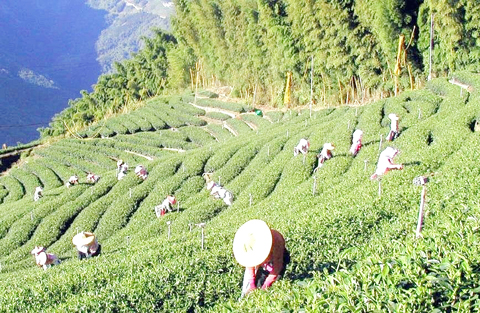A Taiwan-China trade pact that took effect yesterday and will pave the way for tariff cuts from next year has not cheered Taiwanese tea farmers, who are more concerned about rising imports of pesticide-contaminated tea from China into Taiwan.
Although China is Taiwan’s largest tea export market, Lin Yu-ping, one of Taiwan’s many small tea farmers, believes it is unlikely that local farmers will be able to sell their premium products in China.
“Taiwan does not produce quality tea in large amounts and cannot even meet local demand,” she told the Central News Agency in a telephone interview on Saturday.

PHOTO: HSIEH CHIEH-YU, TAIPEI TIMES
Yeh Hsin-zhong, a tea farmer on Alishan (阿里山), one of the country’s noted tea production areas, also made similar remarks.
“There is limited production of Alishan tea due to a lack of available land. How can we export to China when we can barely satisfy local demand?” he asked.
Their remarks came just before the Economic Cooperation Framework Agreement (ECFA) signed between Taiwan and China in late June formally came into force.
The landmark trade pact between Taipei and Beijing will kick off a first round of tariff reductions or eliminations on hundreds of items between the two countries from Jan. 1 next year.
Under the trade agreement, a 15 percent tariff on Taiwanese tea exports to China will be reduced to zero step-by-step in the next three years.
The Taiwan Tea Exporters Association (臺灣區茶輸出業同業公會) has predicted a 30 percent growth in the volume of Taiwanese tea exports to China due to the ECFA.
Taiwan exported 2,375 tonnes of tea last year, which accounted for only 14 percent of total production.
The association’s president, Yvonne Kao (高毅芳), attributed Taiwanese people’s strong demand for local tea to the low export volume.
China is Taiwan’s largest tea export market, with 791 tonnes recorded last year — 33.3 percent of the total exports — followed by the US and Japan, official figures show.
The upcoming tariff cuts, however, do not appeal much to tea farmers like Yeh, who said that local tea is already in hot demand in China.
Yeh expressed concern over the growing amount of lower quality tea from China and Vietnam being fraudulently marketed in China as Alishan tea.
“This problem is becoming serious. Sometimes, there are even complaints from Chinese tourists about buying fake Alishan tea,” he said.
The fake tea problem prompted sales in Mingjian Township (名間) in Nantou County to plunge late last year when tea products from the township sold by the National Palace Museum were reported to contain pesticide residue.
To counter the problem, Wang Chao-kun (王招坤), chairman of the Alishan Tea Production Cooperative (阿里山茶葉生產合作社), urged the government to impose clear labeling on the origin of foreign tea imports.
Another problem facing Taiwanese tea farmers is their peers, who exported high-end tea-cultivation expertise to China years ago.
“These Taiwanese businessmen took tea seedlings, technology, machinery and experienced specialists from Taiwan to China,” Lin said.
Lin blames the government for its past failure to prevent Taiwan’s tea production expertise from going to China.

Quanta Computer Inc (廣達) chairman Barry Lam (林百里) is expected to share his views about the artificial intelligence (AI) industry’s prospects during his speech at the company’s 37th anniversary ceremony, as AI servers have become a new growth engine for the equipment manufacturing service provider. Lam’s speech is much anticipated, as Quanta has risen as one of the world’s major AI server suppliers. The company reported a 30 percent year-on-year growth in consolidated revenue to NT$1.41 trillion (US$43.35 billion) last year, thanks to fast-growing demand for servers, especially those with AI capabilities. The company told investors in November last year that

Taiwanese suppliers to Taiwan Semiconductor Manufacturing Co. (TSMC, 台積電) are expected to follow the contract chipmaker’s step to invest in the US, but their relocation may be seven to eight years away, Minister of Economic Affairs J.W. Kuo (郭智輝) said yesterday. When asked by opposition Chinese Nationalist Party (KMT) Legislator Niu Hsu-ting (牛煦庭) in the legislature about growing concerns that TSMC’s huge investments in the US will prompt its suppliers to follow suit, Kuo said based on the chipmaker’s current limited production volume, it is unlikely to lead its supply chain to go there for now. “Unless TSMC completes its planned six

Intel Corp has named Tasha Chuang (莊蓓瑜) to lead Intel Taiwan in a bid to reinforce relations between the company and its Taiwanese partners. The appointment of Chuang as general manager for Intel Taiwan takes effect on Thursday, the firm said in a statement yesterday. Chuang is to lead her team in Taiwan to pursue product development and sales growth in an effort to reinforce the company’s ties with its partners and clients, Intel said. Chuang was previously in charge of managing Intel’s ties with leading Taiwanese PC brand Asustek Computer Inc (華碩), which included helping Asustek strengthen its global businesses, the company

Power supply and electronic components maker Delta Electronics Inc (台達電) yesterday said second-quarter revenue is expected to surpass the first quarter, which rose 30 percent year-on-year to NT$118.92 billion (US$3.71 billion). Revenue this quarter is likely to grow, as US clients have front-loaded orders ahead of US President Donald Trump’s planned tariffs on Taiwanese goods, Delta chairman Ping Cheng (鄭平) said at an earnings conference in Taipei, referring to the 90-day pause in tariff implementation Trump announced on April 9. While situations in the third and fourth quarters remain unclear, “We will not halt our long-term deployments and do not plan to